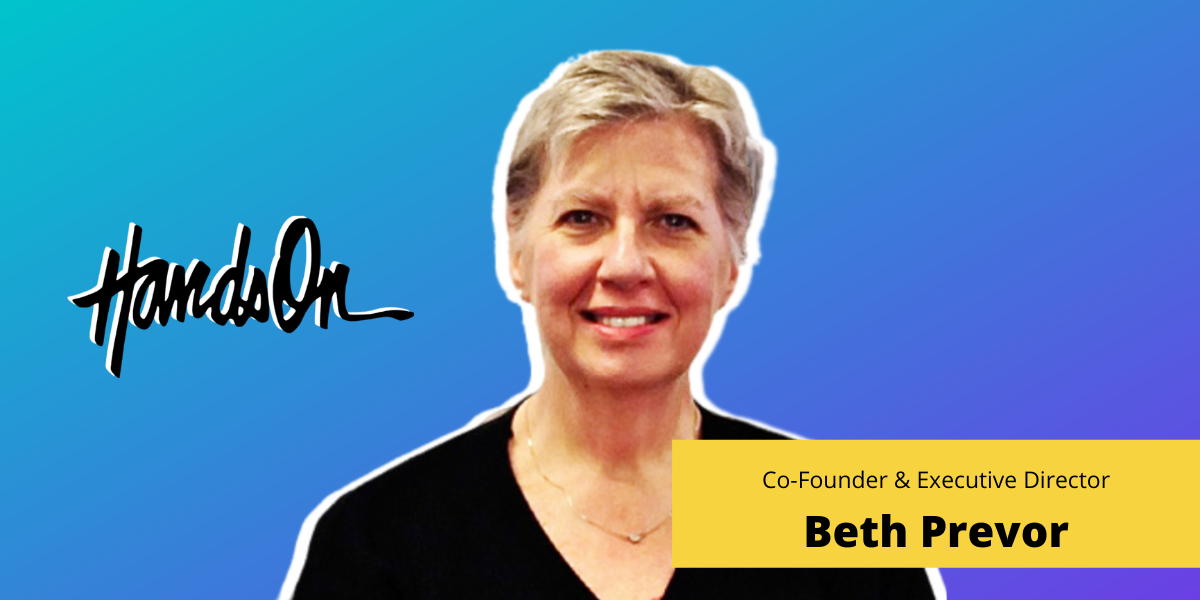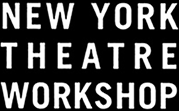

In this very special Community Spotlight interview, our Development Fellow Phoebe Moore sat down with Beth Prevor, Co-Founder and Executive Director of Hands On, to talk about legacy, accessibility, and the future of inclusive theatre. Hands On is an organization that offers Sign Interpreted Performances in the not-for-profit theatrical arena along with information on Deafness and the arts across New York City and the country.
For over 40 years, the Hands On team has provided more than 500 interpreted performances at some of New York’s most prestigious theaters, including the original off-Broadway production of RENT at the Workshop! To learn more about the work this amazing organization does to make theatre spaces more accessible, check out the interview below!
Phoebe Moore, Interviewer:
All right. Well, welcome! Thank you so much for joining us. We really appreciate it, your taking the time to answer some of our questions for our community. So if you wouldn’t mind just introducing yourself what organization you’re representing, and some of the work that you do for the workshop.
Beth Prevor:
Sure my name is Beth Prevor. I’m the executive director of Hands On sign interpreted performances. We’ve been around for, I think we’re getting close to 40 years now. We do sign language interpreted theatre in you know, primarily in New York City, primarily, we work with nonprofits, mostly off-broadway, some Broadway non-profits. We also have been doing recently a couple of Broadway shows as well so some of this is kind of commercial versus nonprofit interest. And we basically coordinate like all aspects of an interpreted performance so we’re generally like a full-service organization. So soups-to-nuts, we we kind of start with, you know, finding a theater finding a show. We hold tickets. We hold sections of the audience. We then hire the interpreters, the interpreters go off and work with their interpretive directors, so they’re doing the work. We kind of advertise to the deaf community. We have a big email listserv. We sell the tickets to the deaf community. Then they come and they watch the show.
Phoebe: That’s amazing, yes. One thing that I definitely noticed was the list of events, and I think that calendar that’s on your website is amazing.
Beth: Thanks.
Phoebe: And I can definitely see the impact here in our audience so that’s just great. So how would you say, I think the difference between what hands on does – you mentioned performance Interpretation – versus like, just providing interpretation services that we might see…I think that one of the really great examples we’ve seen recently was the young lady who was the interpreter at the Super Bowl, so like something along those lines?
Beth: Yeah, yeah, yeah. So that would be, you know, hiring and interpreter which you know, a lot of people have seen interpreters, you know, especially through the pandemics at most events or speeches, or lots of governor conversations during during COVID. But what we do is theatre interpreting. And so what we do really is, interpreters that have rehearsal time. So we really kind of, we’re not just, you know, they’re interpreters, and they probably do a lot of that, you know – interpreting for individuals and speeches. But in addition to that, theatre interpreting is… not that it’s, you know, it’s a lot of work. You know I will say that you know the interpreters, there’s rehearsal time. They’re seeing the show, they’re really get acquainted enough with the show that they’re familiar, and then they’re doing a translation so you’re basically taking an entire script. And you know, generally 3 interpreters maybe 4 are taking an entire, you know, cast script, and translating it, you know, working with their Deaf Director, translating it into another language. So it’s a lot of work, for you know that part of the production, you know as well as you know, it’s kind of being this link between the audience and the production that is up on stage.
And I think one of the things that we’ve learned over the years is that we’re not there to be kind of the center of attention. I mean, we’re not. And there’s a lot of you know, conversations in our community about, you know, even like different terminologies like, I really, you know, try to avoid that word “casting” interpreters that, we really want to try to avoid terms that imply what they do on stage. We’re interpreting. So we’re really that liaison and that link between like I said the audience and the show. We want you to see the show, and we’re there because, you need to show interpreted into another language. But that’s that’s why we’re there. So it’s, we’re not, we’re not there for you to kind of watch us, even though you have to watch us. You’re there for the show, and I think that’s one of the things that we try really to always remember, remember and acknowledge like, who we are in terms of the situation. That I think, when we first started a lot of the response that we would get from the audience is, “I love the interpreters.” Like there was a lot of conversation about the interpreters, and not as much conversation about the play. And I think over the years what I love seeing is that people talk, you know, you can have great interpreters, and not like the play. And that’s what you want people to be able to, you know, respond to the piece of theatre just like we all do through good interpretation. So I think that, that has been like something that I’ve really seen over the years, and really felt, ‘This is what we’ve tried to do.’ We really try to just be that link, and for you to be able to have conversations about the piece of theatre that you’re seeing.
Phoebe: Yeah, yeah, that’s something I definitely noticed with Merrily, speaking of a show that people both loves the interpretation and the show. And I got [to see], well a couple of times just walking by your team, rehearsing beforehand, before the interpreted shows. So would you mind just talking a little bit about your history with New York theatre workshop, your involvement on this last production that we just closed about a month and a half ago now, Merrily We Roll Along, and with RENT as well?
Beth: Absolutely well, actually, the first show we did at New York Theatre Workshop was RENT so now we’re going back 20, isn’t it? wasn’t it just the 25th anniversary?
Phoebe: It was. It was, yeah.
Beth: So we, we were there like when everything was happening.So I do have to say it was like really exciting for us. Well, one is that you know we kind of didn’t know what RENT was gonna be at that time. And so we were actually there. I think we were actually rehearsing, or in the theater tonight.
They announced that Jonathan Larson had died. And so, you know, having, being a part of that experience with a young cast, we were young, you know. We had young interpreters, and just being a part of that experience was incredibly exciting. And so, so that was our first experience at New York Theatre Workshop, which was amazing, that you know, and and that, I think that the fun thing for us as well is that deaf people can say they saw RENT like at the beginning.
And that, to me, too, is like really exciting especially for shows which kind of follows up with Merrily, because… so we did RENT, and we did a couple of other productions, and then a lot of, a lot of times what happens is, you know, especially in like off-Broadway theaters, you get somebody at the theater who’s interested in access and interpretation and kind of takes it on, and whoever was there 25 years ago who kind of, you know, found us. And we worked on this. And we worked on a few other shows, I think at different points they leave. And sometimes they leave with the information, and it doesn’t necessarily get passed on to the next person. And I’ve seen that in several theaters we’ve worked with where once the person leaves, you know things that you know we might have done before just kind of get, you know, fall by the wayside. And so there was a big stretch where we didn’t work with New York Theatre Workshop and I think I met Caitlin Baird at a meeting, and we just started chatting and we started doing, we started talking about accessibility and accessibility at New York Theatre Workshop. And kind of coming to now, when I found out that Merrily was going to be happening, I mean, one is, I knew it was gonna be a hot show. I mean, I knew it’s Sondheim. I knew the show. I knew that it was going to be something that was going to be a really hard ticket to get, and it was going to be something that if you could get in to see it, that would be great.
So when I started talking to Caitlin about possibly coming back and doing some work with New York, Theatre Workshop, that’s the show I thought ‘if you wanna restart a program, if you wanna restart interest from the community, let’s kind of start with something that I know people are gonna want to see.’ I know people are going to be really excited about the ability to be able to be there amongst people who, you know, it was a it was a sold out show! And so the fact that you know, deaf people got to see that show and that production in it’s kind of pre-Broadway move was also something that you going -This is gonna be exciting, for, you know, not only for me personally, which you know, I was thrilled. But I think for the deaf community was, and you know, I think you noticed. I mean, we had a block of tickets. We sold it out. I mean deaf people loved it so. It was just, you know, there was this gap, but hopefully we’ll be back again.
Phoebe: Yes, and I, for one, I’m definitely looking forward to it. So you’ve talked a little bit about your journey I think, in in shifting the industry to be more accessible for the deaf and hard-of-hearing community. And I think you said that your career in this field in particular, has been longer than 25 years, which is when RENT first started at the Workshop, so can you talk a little bit about how your work has kind of helped shift the industry to be more accessible in this space even before I think the pandemic? You made a great point about, because things were more virtual over that time, you know, bringing in captioners and bringing in interpreters felt like a very important thing to do. So even before that [time], how have you seen the industry shifts to be more accessible now?
Beth: Well, I mean, I guess over the years I mean, it’s a great question, and I think what we’ve seen is that we’re trying to kind of have people acknowledge that this is a profession, and we’re professionals. And we’re not a social service agency, and you know, and what we do, you know, because part of this is, you know, there’s a budget involved. I mean, interpreters get paid, and you know, and we want people to understand that, you know, which I guess is still a question we’re having and still somewhat of a struggle to, you know, for people to understand that there’s budgets involved, and there’s fees involved, and people should be paid for their time, and people should be acknowledged as being what, as what they do as a professional is kind of worthy, just like everybody else in our field. You know the arts is professional, and so we’re trying to, we’re trying to kind of elevate the the whole field to kind to really kind of talk about there’s skill involved. There’s training involved. There’s, you know, you know, that the audience is worthy of getting these kind of services, and that what the interpreters do is a lot of work, and you know, and you know that we’re looking for respect from the outside community to understand that it’s always a struggle.
I mean, I do have to say that you know we still have to fight for people to understand the importance of access in for any, for any you know part of the deaf and disability community that, you know access is not is not something that just happens. Access shouldn’t be, you know, a gift that you give to people in the community. It’s a right. Everybody has, you know, when we’re dealing with culture and the arts, you know, for people to understand that this is a part of life, and everybody should have the ability to, you know, to access the arts, especially in a place like New York which is not a an easy environment, for this. So while we work with some wonderful theaters, who are, you know, dedicated to this aspect of their inclusion and understand that, deaf and disabled people are parts of their community, there’s still a whole segment, and there’s a whole aspect of this where you still, you still, it’s still a struggle. It’s still something that I mean – Our work is not done, and I think it, you know, explaining to people, you know. Also, like you said, I’ve been doing this for a long time. I mean, after a while, you know, it’s exhausting constantly having to explain and I’ve come to a point where, if somebody wants to do this, they they have to wanna do this for the right reason. And I don’t think that we should have to go in and fight for what we need as professionals.
And when it gets to that point where what you’re doing is too much fighting for things, and people are not understanding, you know, sometimes you just go, ‘You know. Maybe you’re just not ready for this.’ I mean, I can, I can only explain so much about why somebody can do it, and at a certain point you just go, “You should do it.” I can’t, you know, I don’t know how much more I can explain to anybody to just say I don’t think that what we’re asking for is too much. I don’t think the monies that we’re asking for are too much. I think people get paid what they’re valued at. And again I think you know, in this country we put a lot of value on you know, money and money kind of equals value, and you’re just going, “we don’t work for free and nor should interpreters work for free.” so you know, at a certain point, you just go if you don’t understand this, and you can understand this, maybe it’s just not the right time for you.
Phoebe: And so with that, what do you see for the feature of Hands On, for the future of this work specifically in the theater industry? You mentioned earlier just like with institutions themselves and the possible turnover that might occur, what are some ways that you think that this could be a more sustainable practice with theaters who definitely realize, like this work is important and should be respected and should be included?
Beth: Well, I think I mean one is, we’re really busy now, which is great. I mean, we’re a very small organization and we also have to recognize that it’s not just that we’re small, that our field is small.
So the field of you know, theatrical interpreters, is small. The field of you know theatrical deaf directors is small. Even the audience is, you know, it’s a small segment of the overall population of people that go to theatre and and to the arts. So we’re kind of dealing with the realities as well of, you know we live in a city where there’s hundreds of theaters that, so there’s hundreds of shows that are going on all the time.
We don’t have the resources to be able to say every show should be interpreted all the time. So we really, we really are incredibly intentional about the shows that we work with.
You know, also, from from our aspect we have to like sell the tickets. So we have to, we do the promotion. So we also have to look at the piece and go, “Do we think that this is a piece that is going to be, you know, popular within the deaf community?” And that actually is one of you know, popular within the deaf community, And that actually is one of you know, if you’re talking about like the future of Hands On, and things that we’re working on right now, I mean one of the things that we’re working on right now, I mean one of the things that I’m really interested to kind of pursue is we have to figure out like better ways to kind of work with the deaf community, and you know, with with other communities.
But just to go, it can’t just be our decision about picking the shows that we wanna do, you know? I look at the show, and I try not to have it be my aesthetic, but really to kind of look at a piece and go, ‘I think that there’s, I think, that there’s interest, that would be of interest to the deaf community or I think that was it.” But I think we have to do a better job of reaching out to the community and figuring out ways, especially in this environment, where the representation is so important. And so when we get shows that you know we’re dealing with, you know, different representations like, where do we fit as interpreters in terms of that? Because our pool is so much smaller, if a show is based on a, with a specific representation in mind, or you know, on the stage, if we can’t match that representation, what do you want us to do?
And that to me is like the biggest question for me right now, and I think until we can have more community conversations, you know, with people to just go, “How do you wanna handle it?” If I can’t find Iranian interpreters – because that’s what the show is – do you want us not to interpret it? Which means you don’t see the show. Or do you want us to find good interpreters? You know? So it’s it’s those kind of questions, I think, in this kind of period of time in the world, that, like everybody, is grappling with representation, that we’re not quite sure, what to, you know, how to handle that and what to do. And I think until we really kind of open it up and have these have more of these kind of conversations, I think that’ll be helpful for everybody. One is to kind of get a better handling from the community as to what you want us to do, but I think it’s also like having them trust us that we’ve either done due diligence in terms of, “We’ve looked. We can’t find interpreters. Now, what?” So that to me is like the biggest kind of future next step about things that are important for us to look into.
Phoebe: Thank you. Well, Beth this is really been wonderful and enlightening and definitely something that was very much looking forward to sitting down with you to talk about. I think I’d like to end with the question of what inspires you, something along a little lighter. Especially going into spring, I like this concept of like renewal and rebirth, and now that the sun is at a little bit longer, definitely a good question to think about. So what inspires you?
Beth: You know, I think with, you know, all the work that you do kind of up to the final product is a lot of work, and I think it’s getting to those positions where, when we do an interpretive performance, it’s a community event. I, I can’t tell you when you get there. I see people that I know. People hug you, people kiss you. People ask you how you’re doing. It’s such a, it’s such a warm, welcoming environment. I see people who haven’t seen each other for a while. It’s, it’s a different kind of experience than going to the theatre alone. And I, and I will say that you know I’m not, I’m not saying that one is better than the other.
It’s just that what we do is is an event. It’s for a group of people in the community who know each other, who know us and I love it.
When we do Shakespeare in the Park which we’ve been doing for I think, almost 40 years now, I can’t tell you the people that I haven’t seen in a year (because there’s some people that just go to Shakespeare in the Park) that is inspiring. I just love it. I love the people who kind of come up, “How you been? How’re you doing?” It’s, it’s so much fun, and it kind of takes away any of the work that you’ve just been doing. It’s not, it doesn’t feel like work. It’s just, it’s so enjoyable. And it kind of it inspires me.
That’s why I do this. I do this for people to attend theatre. I love theatre. I’ve always loved theatre. I do this for people to attend theatre. I love theatre. I’ve always loved theatre. I think theatre is really what we do kind of takes you away, especially from an interpreting aspect of it, you know, and you’re not seeing a doctor. You’re not seeing, you know, you’re not going to school – you’re going for pleasure. And that’s what we want everybody to, to be. They want, we want them to enjoy themselves, and we work hard to achieve that. And I think I think people trust us enough that they do.
Phoebe: I think they do, too! Thank you so much. This was wonderful. We’re so excited to feature you and Hands On for our community spotlight this month. And yeah, thank you!
Beth: Well, thank you. It was fun, and I love the theater and loved Merrily, so hope to hope to be back!
Phoebe: Yes, definitely.
Beth: Yeah, thanks a lot!
Phoebe: Thank you.
To learn more about Hands On and check out what shows they will be interpreting near you, visit HandsOn.org/calendar.
Explore more
Categories: Community Spotlight. Tags: Accessibility and Hands On.

 My Cart
My Cart My Account
My Account Gift Certificates
Gift Certificates Find Us
Find Us




